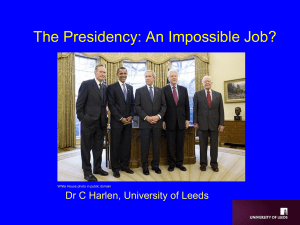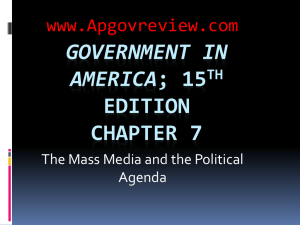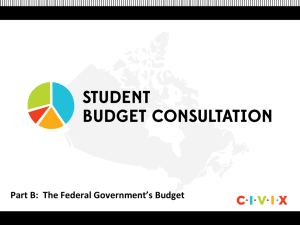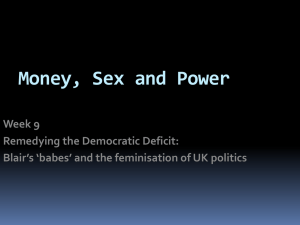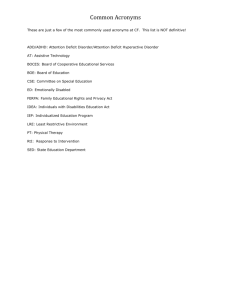Anxieties of Democracy
advertisement
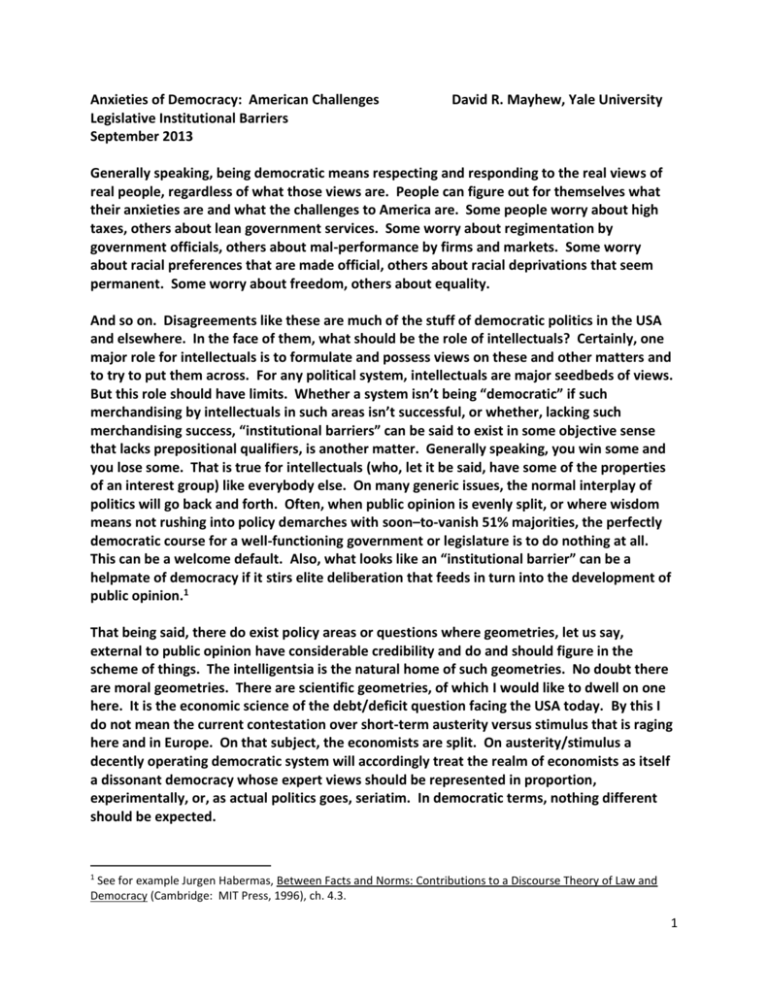
Anxieties of Democracy: American Challenges Legislative Institutional Barriers September 2013 David R. Mayhew, Yale University Generally speaking, being democratic means respecting and responding to the real views of real people, regardless of what those views are. People can figure out for themselves what their anxieties are and what the challenges to America are. Some people worry about high taxes, others about lean government services. Some worry about regimentation by government officials, others about mal-performance by firms and markets. Some worry about racial preferences that are made official, others about racial deprivations that seem permanent. Some worry about freedom, others about equality. And so on. Disagreements like these are much of the stuff of democratic politics in the USA and elsewhere. In the face of them, what should be the role of intellectuals? Certainly, one major role for intellectuals is to formulate and possess views on these and other matters and to try to put them across. For any political system, intellectuals are major seedbeds of views. But this role should have limits. Whether a system isn’t being “democratic” if such merchandising by intellectuals in such areas isn’t successful, or whether, lacking such merchandising success, “institutional barriers” can be said to exist in some objective sense that lacks prepositional qualifiers, is another matter. Generally speaking, you win some and you lose some. That is true for intellectuals (who, let it be said, have some of the properties of an interest group) like everybody else. On many generic issues, the normal interplay of politics will go back and forth. Often, when public opinion is evenly split, or where wisdom means not rushing into policy demarches with soon–to-vanish 51% majorities, the perfectly democratic course for a well-functioning government or legislature is to do nothing at all. This can be a welcome default. Also, what looks like an “institutional barrier” can be a helpmate of democracy if it stirs elite deliberation that feeds in turn into the development of public opinion.1 That being said, there do exist policy areas or questions where geometries, let us say, external to public opinion have considerable credibility and do and should figure in the scheme of things. The intelligentsia is the natural home of such geometries. No doubt there are moral geometries. There are scientific geometries, of which I would like to dwell on one here. It is the economic science of the debt/deficit question facing the USA today. By this I do not mean the current contestation over short-term austerity versus stimulus that is raging here and in Europe. On that subject, the economists are split. On austerity/stimulus a decently operating democratic system will accordingly treat the realm of economists as itself a dissonant democracy whose expert views should be represented in proportion, experimentally, or, as actual politics goes, seriatim. In democratic terms, nothing different should be expected. 1 See for example Jurgen Habermas, Between Facts and Norms: Contributions to a Discourse Theory of Law and Democracy (Cambridge: MIT Press, 1996), ch. 4.3. 1 But on the question of long-term debt/deficit, a pretty good consensus seems to exist among economic experts that a big problem exists and that it has deployable solutions. In public opinion generally, this view seems to be fainter albeit visible. The experts are saying: Do something. The public and the elected officials are more relaxed. The thought ingredients of the expert view are familiar: Elected officials aren’t good at time discounting; even aside from that, they tend to run short on instrumental rationality in handling money; they lollygag and deadlock; eventually the bills will come due to the grandchildren. One way to see all this is as a problem of cross-cutting issue dimensions. These days, the most important relevant dimension for the public and the politicians is taxing/spending/size of the public sector, etc. That is dimension number one. Number two is long-term debt/deficit versus its absence, but this second concern is more recessive, and, in political practice, dealing on dimension one gets in the hair of dealing on dimension two. So what about “institutional barriers” on this debt/deficit front? If there are institutional problems, what are they? Clearly, or at least it seems so, there is a policy failure in the sense that for several decades the US federal government has been racking up money commitments without paying for them enough. It is not Greece but it is bad. In process terms, who are the suspects and where are the smoking guns? Is it divided party control of the government, of which we have had a lot? This is a suspect for a lot of things that go wrong. I do not see any credible case that US money handling has been worse under conditions of divided party control. Fortunately, in an analytic sense, there is a good deal of experience to look at. But just run the instances through your mind. Deficits were racked up under Reagan (divided control) but they also drew force under Bush 43 in early 2001 and 2003-06 and under Obama in 2009-10 (all unified control). Taming of deficits occurred under Clinton in 1993-94 (unified) but also under Bush 41 in 1989-90 and Clinton (cum Gingrich) in 1995-2000 (divided). In the case of Obama and the Democrats in 2009-10, there is the obvious point that it made it made sense to run a large deficit to palliate the Wall Street crash, yet the full record of Obama’s first term shows the limits of a divided-versusunified logic as well as something else—the quite surprising flexibility of the US system. Apparently, the USA, if pitted against thirty-three other well-off countries, placed number one in the size relative to GDP of its countercyclical fiscal package in late 2008 and calendar 2009.2 But during the ensuing Congress of 2011-12, a time of divided party control, the government took a $2.7 trillion bite out of debt-deficit--$900 billion directly plus another $1.2 trillion via the sequester of August 2011 (ugly though that move might have been), and then another $600 billion through Obama’s chiefly high-brackets tax hike after the 2012 election.3 It would take some checking, but altogether that $2.7 trillion might be the biggest such bite in US history.4 2 Klaus Armingeon, “The Politics of Fiscal Responses to the Crisis of 2008-09,” Governance 25:4 (October 2012), 543-65, at 549. 3 Technically, the tax hike occurred on January 1, 2013, yet the outgoing Congress elected in 2010 enacted it. 4 It seems to dwarf the sizable deals of 1990, 1993, and 1997. Of course, the problems were bigger in 2011-12. 2 How about supermajoritary processes, notably in the Senate, as a suspect? That much commented-on dog doesn’t seem to hunt, either. Federal budgets, as it happens, enjoy the grease of majoritarianism. The reconciliation procedure of the Budget and Impoundment Act of 1974 immunizes budgets against Senate filibusters. Presidents and party majorities are well aware of this huge hole in the supermajority dike and they have routinely taken advantage of it. In actuality, perhaps the system isn’t supermajoritarian enough, Larry Summers has written: “There should have been more checks and balances in place before the huge tax cuts of 1981, 2001 and 2003 [think reconciliation], or to avert the many unfunded entitlement expansions of the past few decades. Most experts would agree that it is a good thing that politics thwarted the effort to establish a guaranteed annual income in the late 1960s and early 1970s and the effort to put in place a ‘single-payer’ healthcare system during the 1970s.”5 Recently, reconciliation ushered in the Affordable Care Act of 2010, whose downstream fiscal effects on current evidence seem up for grabs. Where does this leave us? A plausible expert geometry is not cranking through the US system well enough, but it is hard to nail down structural reasons for that failure. Is it that presidential systems do worse on this front than parliamentary ones? Well, probably not. 6 For that matter, is it the case the USA is doing worse than other well-off countries in general? This is a hard one, but on balance the US performance looks like being no worse than generic, if a not very attractive generic.7 How about leadership? Perhaps there is no escape from it. Consider the roles of Joe Biden and Mitch McConnell in recent years.8 I would guess that the debt/deficit problem places an especially heavy weight on US presidents to act as leaders, and that this is not a new thing. A 2009 book by Iwan Morgan makes the case.9 For elected politicians, the incentives in money handling are perverse and it falls on presidents to help cabin those propensities. Morgan argues that some presidents have taken a front-burner interest in debt/deficit—Carter, Bush 41, Clinton. Others have been more relaxed—Reagan, Bush 43, Obama (as of 2009). Nontrivial differences in policy have ensued from these differences in White House priorities. Yet in political terms, to expect presidents to be budget hawks does ask a lot, which makes for a supply problem. We are asking for self-sacrifice by presidents or their parties. It probably did not do Hoover any good to sign on to a huge tax hike in calendar 1932 (a dubious idea in economic terms anyway, probably), or Eisenhower to forego pump priming, or Carter to break with his party spenders, or Bush 41 to promote the tax-hiking budget deal of 1990 (so much for “read my lips”), or Clinton to generate the tax-hiking budget deal of 1993. 5 Lawrence Summers, “America’s Problem Is Not Political Gridlock,” Financial Times, April 14, 2013. See for example Jose Antonio Cheibub, “Presidentialism, Electoral Identifiability, and Budget Balances in Democratic Systems,” American Political Science Review 100:3 (August 2006), 353-68. 7 Summers ranks the USA reasonably high in the pack. 8 See Bob Woodward, The Price of Politics (New York: Simon & Schuster, 2012). 9 Iwan Morgan, The Age of Deficits: Presidents and Unbalanced Budgets from Jimmy Carter to George W. Bush (Lawrence: University Press of Kansas, 2009). 6 3 Yes, the debt/deficit problem is a challenge to democracy. It is a particular kind of challenge—expertise rubs up against quotidian views. It does not seem to map onto any particular constitutional or congressional malfunction of process—unless we consider the virtual unfathomability of budget politics these days, another kind of difficulty.10 Much seems to depend on the will of politicians to vend expertise to the public, or else to act on it themselves at a stiff political price. 10 See Louis Fisher, “Presidential Budgetary Duties,” Presidential Studies Quarterly 42:4 (December 2012), 754-80, at 768-70; James A. Thurber, “The Dynamics and Dysfunction of the Congressional Budget Process: From Inception to Deadlock,” ch. 13 in Lawrence C. Dodd and Bruce I. Oppenheimer (eds.), Congress Reconsidered (Los Angeles: Sage, 10th ed., 2013), at pp. 334-39. 4

